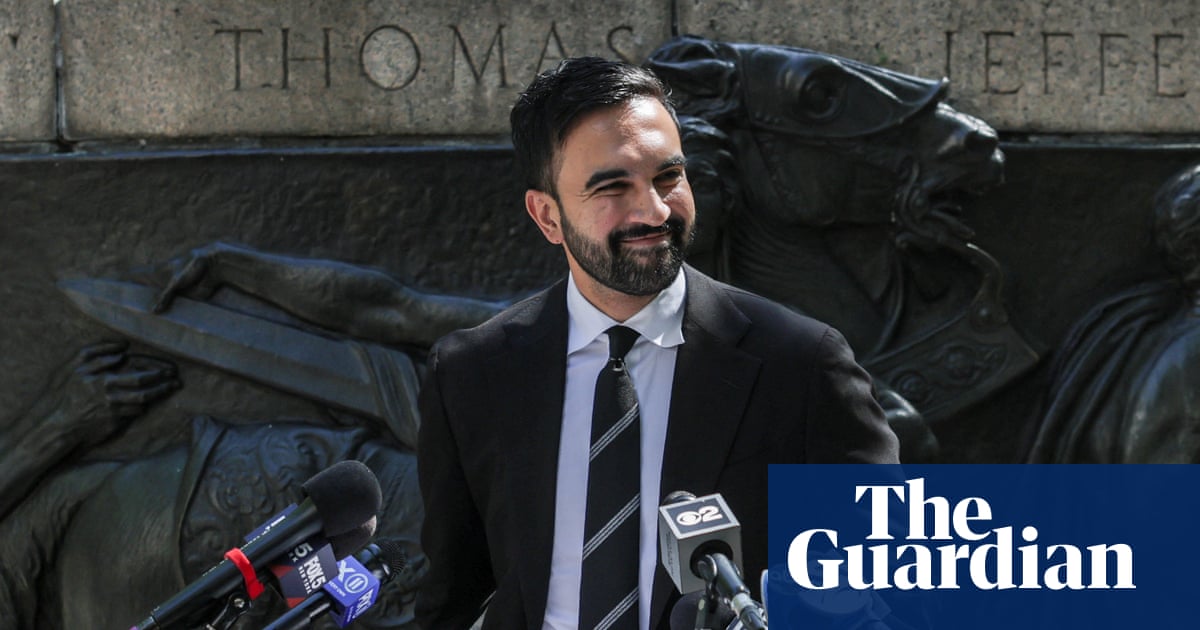A number of people who deny the legitimacy of the 2020 election, and often of other elections in which Republicans have not been victorious, have been elevated to positions of power since Donald Trump’s re-election, raising concerns about the potential for partisan meddling in critical parts of the country like Arizona and Georgia.
State by state, activists aligned with the “election integrity” movement have found their way on to local elections boards and elections offices, raising red flags for Democrats who have already started efforts to have them removed.
“I think Republicans want to put us in jail,” Fulton county commissioner Dana Barrett said, moments after a contempt hearing in an Atlanta, Georgia, courtroom in August, where she and five other county commissioners were fighting a battle to reject the appointment of two Republican election denialists to the Fulton county board of registrations and elections.
The commission’s charter says the board must appoint two nominees made by each political party. A finding of criminal contempt could have resulted in commissioners being jailed until they agreed to make the appointment, but Fulton county superior court judge David Emerson found the board in civil contempt last month for refusing to vote for the appointment as ordered by the court. A $10,000 daily fine for failing to make the appointment is on hold, pending appeal.
“At the end of the day, we have no choice but to resist,” Barrett said. “This is not a particularly strategic move on my part, but rather a move to defend the integrity of our elections and to do what I can in my corner of the world to try to help hold this democracy together. If that means I’m resisting, then by all means, I’m resisting.”
One of the two appointees in question, Julie Adams, works for the Election Integrity Network, an election denial activist organization founded by Cleta Mitchell, a Trump ally who aided his efforts to overturn the election in Georgia and elsewhere. The other, Jason Frazier, is a consultant for EagleAI, software that collects open-source data of dubious validity to aid activists making thousands of voter challenges at a time. Frazier was a plaintiff in a 2023 lawsuit demanding voter registration purges by the county and the state.
“I believe that Jason Frazier and Julie Adams are election deniers,” Barrett said.
“We all find ourselves in positions where we have to make tough decisions considering the climate in our country,” said Fulton county commissioner Mo Ivory. “I’m glad to be standing up for the people that put me in office, and continue to fight for our democracy, not for partisan politics, but for what it means to live in a democracy.”
In Georgia, board appointments to county election offices are idiosyncratic. Fulton county’s charter gives power to the board of commissioners and to the political parties’ county committees. In neighboring DeKalb county, the appointments are made by the chief judge of its superior court, who is free to reject a nominee by one of the party’s committees if that person doesn’t meet the judge’s legal standards.
Such was the case earlier this year, when Shondeana Morris, chief judge of the DeKalb county superior court, rejected William Henderson after a letter campaign by the county’s Democratic committee and voting rights activists. But the judge did allow the appointment of Gail Lee, another Republican activist linked to the Election Integrity Network.
During a DeKalb county election board meeting last week, local political activists challenged the qualification of Jason Lary, a former mayor of Stonecrest, Georgia, to run for the city council. Lary recently returned from federal prison, where he was serving a sentence for fraud after being convicted of stealing hundreds of thousands of dollars in federal Covid-19 relief funds allocated to the city.
Lary is a Democrat and the board has a Democratic majority, but after a brief discussion, the board voted unanimously to kick him off the ballot and strip him of his voter registration, given that he was still under supervision for his sentence and thus ineligible to vote.
“The one thing that became clear is the importance of the public to remain vigilant on little things like people who qualified for office,” Lee said at the end of the meeting. “Because if a person hadn’t come for and challenged the candidates then they would have gone forward and possibly had a felon in office.”
There’s only so much a Republican activist can accomplish on a five-person board with a Democratic majority, as is the case in metro Atlanta’s core counties. When Adams refused to certify a primary election in Fulton county in 2024, state superior court judges ruled that she was required to do so by state law, a decision affirmed by the Georgia supreme court this week. The duty to certify is “ministerial”, a pronouncement that is obligatory, not discretionary.
And many if not most decisions by an elections board involve mundane procedural questions about where to site a voting drop box or how to schedule poll worker training. Even contentious issues often result in unanimous votes.
But elections offices are staffed by human beings maintaining sensitive equipment and critical records, all of which are vulnerable to someone with authority and an agenda.
Protect Democracy, an advocacy organization, describes a strategy of election subversion in three parts: deceive, disrupt and deny.
Disinformation from influencers suggests that voter fraud or noncitizen voting occurs often enough to swing an election. Then these influencers call on their supporters to disrupt election administration and voting process and introduce chaos into the system. Finally, they attempt to interfere or halt the certification process and “declare the true result untrue, unknown, or unknowable”, Protect Democracy’s advocates wrote.
The object is to allow the loser to claim victory regardless of the results, forcing a court to either choose a winner or order a new election, delegitimizing a fair vote.
Changes wrought by a new law specific to Spalding county, Georgia, populated its board with Republican election activists. The board members and the county’s new elections director called for a hand-count of ballots following elections in 2022 and 2023. The process, observers noted, was painfully slow and riven by inaccuracies that took days to rectify, with an end result that showed Dominion machines had counted votes correctly.
They did not hand count ballots in 2024.
Spalding county’s Republican elections board members – Ben Johnson, Roy McClain and James Newland – are among the many defendants in a federal lawsuit seeking to overturn a law permitting mass voter challenges passed in the wake of the 2020 election that voting rights advocates argue violates the Voting Rights Act.
Meanwhile, Maricopa county’s board of supervisors has been in a political war with the county’s elected recorder Justin Heap to prevent this outcome. Maricopa county contains Phoenix and almost two-thirds of Arizona’s population.
Heap, a former state representative, defeated the incumbent Republican in 2024 while refusing to say if he believed the 2020 and 2022 elections were fair and calling Maricopa county elections a “laughingstock”.
After Heap’s victory, the board stripped the recorder’s office of its duties to manage in-person early voting and some IT management of voter rolls. Negotiations broke down in May, leading to lawsuits and acrimony. Heap retained America First Legal, a Trump-aligned firm, to represent him in the lawsuit.
“Justin Heap is lying about me, and going forward, he better keep my name out of his lying mouth,” Maricopa county supervisor Steve Gallardo said in a July release, refuting claims by Heap that Gallardo had agreed to restore power to the recorder’s office. “Since his election, Justin Heap has taken actions that have confused voters and damaged relationships. This must end. Justin Heap should stop the performative theater and just do his job.”
Some states appear to be more fertile ground than others for election denialist’s influence on boards.
North Carolina’s Republicans controlled the state legislature with a veto-proof majority last year, even though its former governor Roy Cooper was a Democrat. After Josh Stein, another Democrat, won the governor’s race, legislators stripped the governor of the power to appoint members to state and county elections boards, handing it to newly elected state auditor Dave Boliek, a Republican.
The state’s Republican-majority supreme court ratified the law in May after court challenges. Boliek almost immediately replaced 3-2 Democratic majorities with 3-2 Republican majorities across all 100 county election boards.
Those appointments have drawn pushback from election denialists as well as from Democratic activists.
Places like Durham county, where less than 10% of voters are registered Republicans, now has a Republican majority on its elections board. But most new board members appear to have been rewarded for their loyalty to the party and not their fidelity to election denialism.
“There are concerns that there are people that are getting rewarded as a political favor, as opposed to their working knowledge and their experience in elections,” said Jim Womack, Lee county GOP chair and the president of the non-profit North Carolina Election Integrity Team, speaking to North Carolina news site The Assembly.

 German (DE)
German (DE)  English (US)
English (US)  Spanish (ES)
Spanish (ES)  French (FR)
French (FR)  Hindi (IN)
Hindi (IN)  Italian (IT)
Italian (IT)  Russian (RU)
Russian (RU)  3 hours ago
3 hours ago
























Comments